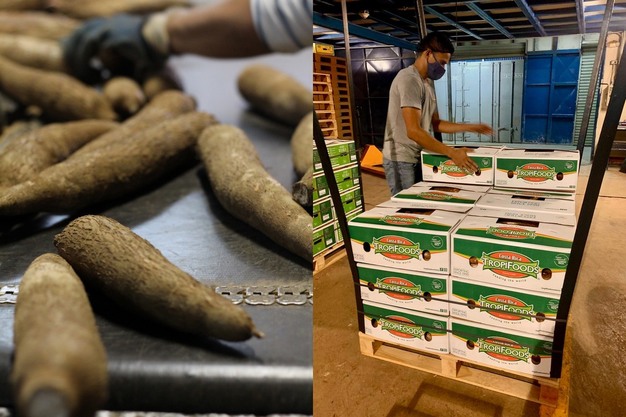Tropifoods, a Costa Rican family business devoted since 1990 to the export of tropical roots, especially cassava, has been involved in one of the most important changes that this sector has undergone in recent years. Following the ban on the use of paraffin (a petroleum derivative) in food within the European Union, the market has been forced to look for safe alternatives to preserve the product’s quality during transport.
Joshua Guerrero, operations and financial manager at Tropifoods, says that the roots and tubers sector, led by Ceryt (Chamber of Roots and Tubers Exporters), launched a research and development process in 2021 together with several Costa Rican companies specializing in coating solutions. “We started four years ago, coinciding with the regulatory change. Today we use a natural wax made of vegetable fatty acids, duly registered and approved under EU regulation 1333,” he says.
 © Tropifoods
© Tropifoods
The new wax is fully replacing paraffin and complies with European food safety requirements. “We are not the product’s inventors, but we are part of the group of companies that collaborated in its development. It is the result of a joint effort from the sector and marks the start of a new stage for Costa Rican cassava,” says Guerro.
The new wax is applied practically in the same way as the traditional one, which facilitates adaptation in the packing plants. “The production line remains the same: washing, drying, and waxing. The coating is applied in less than a minute and helps preserve the product’s quality during transport to the main European ports, which takes 15 to 18 days,” he says. Tropifoods expects to make its first shipment to Algeciras with the new wax in the next few weeks.
 © Tropifoods
© Tropifoods
On the financial side, Guerrero acknowledges that replacing paraffin wax implies an increase in costs. “Plant-based wax is more expensive, as it’s not yet produced on a large scale. It is a new and recently developed product, but it was necessary to make the transition. At the moment, regardless of the price, we aim to guarantee compliance with all regulations and maintain access to the European market,” he says.
Despite this increase, the manager believes that the impact will be borne gradually by the market. “End clients will also have to adapt to this new reality, as the entry of cassava with paraffin to ports such as Algeciras is strictly prohibited. It is a mandatory transition, but one that will bring long-term benefits for all,” he says.
The development of this plant-based coating not only responds to a regulatory need but also marks a breakthrough for a sector that hadn’t made any significant changes in its post-harvest processes for years. “It is an innovation that is modernizing the industry and strengthening the reputation of Costa Rican cassava in international markets,” says Guerrero.
 For more information:
For more information:
Joshua Guerrero
Tropifoods
Costa Rica
Tel.: +506 7013 3700
[email protected]
